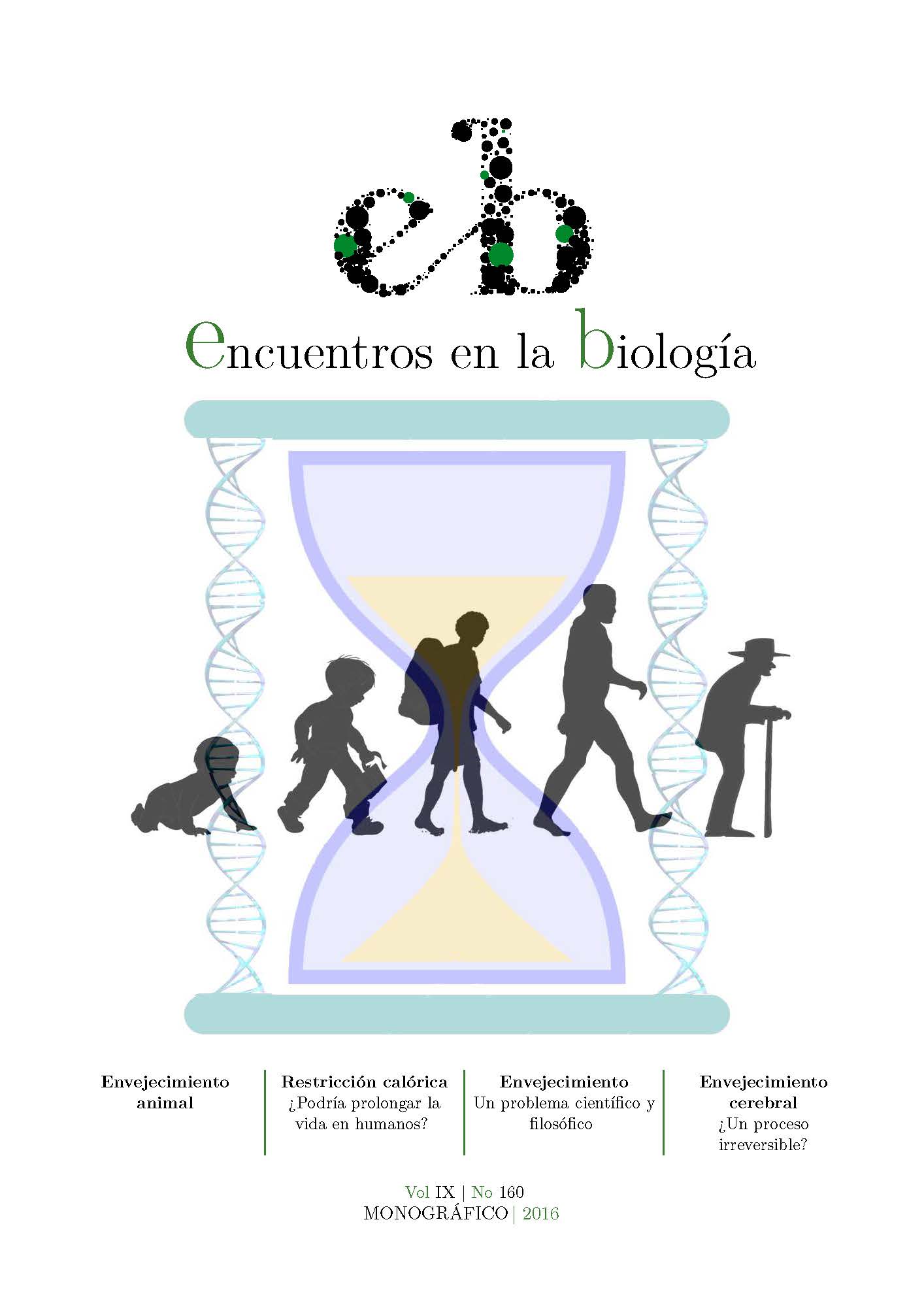Could caloric restriction prolong life in humans?
Abstract
Caloric restriction, or the reduction of caloric intake without malnutrition, is nowadays one of the most exciting and controversial interventions in the biogerontology field. It is known to be the only one to extend lifespan in a wide range of species, including mammals. Several experiments have proven the effectiveness of caloric restriction. However, its side effects and long-term implications in humans are still to be determined. Here, we collect some of the most important experiments done so far in mammals and discuss about the potential impact that this kind of intervention would have in the future society.
Downloads
Metrics
Publication Facts
Reviewer profiles N/A
Author statements
Indexed in
-
—
- Academic society
- N/A
- Publisher
- Uma Editorial. Universidad de Málaga
References
Osborne TB y otros The effect of retardation of growth upon the breeding period and duration of life of rats. Science 45(1160): 294-295, 1917.
McCay C y otros. The effect of retarded growth upon the length of life span and upon the ultimate body size. J Nutr 10(1): 63-79, 1935.
Weindruch R y otros. The retardation of aging in mice by dietary restriction: longevity, cancer, immunity and lifetime energy intake. J Nutr 116(4): 641-654, 1986.
Masoro EJ. Overview of caloric restriction and ageing. Mechanisms of ageing and development 126(9): 913-922, 2005.
López-Otín C y otros. Metabolic Control of Longevity. Cell 166(4): 802-821, 2016.
Kirkwood, T. El fin del envejecimiento. Ciencia y longevidad. Barcelona: Metametas, 2000.
Masoro EJ. Caloric restriction and aging: an update. Experimental gerontology 35(3): 299-305, 2000.
Holloszy, JO. Mortality rate and longevity of food-restricted exercising male rats: a reevaluation. Journal of Applied Physiology 82(2): 399-403, 1997
de Grey AD y otros. Is human aging still mysterious enough
to be left only to scientists? BioEssays 24(7): 667-676, 2002.
Pamplona R y Barja G. Mitochondrial oxidative stress, aging and caloric restriction: the protein and methionine connection.
Biochim Biophys Acta 1757(5-6): 496-508, 2006.
Hambly C y otros. Hunger does not diminish over time in mice under protracted caloric restriction. Rejuvenation research 10(4): 533-542, 2007.
Zhang Y y otros. The Effects of Calorie Restriction in Depression and Potential Mechanisms. Current Neuropharmacology 13(4): 536-542, 2015.
Kemnitz JW y otros. Dietary restriction of adult male rhesus monkeys: design, methodology, and preliminary findings from the first year of study. J Gerontol 48(1): B17-26, 1993.
Lane MA y otros. Caloric restriction in primates. Ann N Y Acad Sci 928: 287-295, 2001.
Harrison DE y Archer JR. Genetic differences in effects of food restriction on aging in mice. J Nutr 117(2): 376-382, 1987. 16
Pugh TD y otros. Dietary intervention at middle age: caloric restriction but not dehydroepiandrosterone sulfate increases lifespan and lifetime cancer incidence in mice. Cancer Res 59(7): 1642-1648, 1999.
Richardson A y otros. Significant life extension by ten percent dietary restriction. Ann N Y Acad Sci 1363: 11-17, 2016.
Gillespie ZE y otros. Better Living through Chemistry: Caloric Restriction (CR) and CR Mimetics Alter Genome Function to Promote Increased Health and Lifespan. Front Genet 7: 142, 2016.
Downloads
Published
How to Cite
Issue
Section
License
Esta obra está bajo licencia internacional Creative Commons Reconocimiento-NoComercial-CompartirIgual 4.0.
Esta revista provee acceso libre inmediato a su contenido bajo el principio de hacer disponible gratuitamente la investigación al público. Todos los contenidos publicados en Encuentros en la Bilogía están sujetos a la licencia Creative Commons Reconocimento-NoComercia-Compartirigual 4.0 cuyo texto completo puede consultar en <http://creativecommons.org/licenses/by-nc-sa/4.0>
Se pueden copiar, usar, difundir, transmitir y exponer públicamente, siempre que:
Se cite la autoría y la fuente original de su publicación (revista, editorial y URL de la obra).
No se usen para fines comerciales.
Se mencione la existencia y especificaciones de esta licencia de uso
Los derechos de autor son de dos clases: morales y patrimoniales. Los derechos morales son prerrogativas perpetuas, irrenunciables, intransferibles, inalienables, inembargables e imprescriptibles. De acuerdo con la legislación de derechos de autor, Encuentros en la Biología reconoce y respeta el derecho moral de los autores/as, así como la titularidad del derecho patrimonial, el cual será cedido a la Universidad de Málaga para su difusión en acceso abierto. Los derechos patrimoniales, se refieren a los beneficios que se obtienen por el uso o divulgación de las obras. Encuentros en la Biología se publica en open access y queda autorizada en exclusiva para realizar o autorizar por cualquier medio el uso, distribución, divulgación, reproducción, adaptación, traducción o transformación de la obra.
Es responsabilidad de los autores/as obtener los permisos necesarios de las imágenes que están sujetas a derechos de autor.
Los autores/as cuyas contribuciones sean aceptadas para su publicación en esta revista conservarán el derecho no exclusivo de utilizar sus contribuciones con fines académicos, de investigación y educativos, incluyendo el auto-archivo o depósito en repositorios de acceso abierto de cualquier tipo.
La edición electrónica de esta revista esta editada por la Editorial de la Universidad de Málaga (UmaEditorial), siendo necesario citar la procedencia en cualquier reproducción parcial o total.


